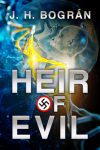

March 25 – 31: “Why do you think we’re always returning to the Holocaust during World War Two in books and movies?
 The Holocaust during World War II is a recurring theme in books. This week ITW Members Jerry Amernic, Martin Roy Hill, Ellen Butler and J. H. Bográn will investigate why we’re always returning to that era in books, movies and stories in general? Scroll down to the “comments” section to follow along!
The Holocaust during World War II is a recurring theme in books. This week ITW Members Jerry Amernic, Martin Roy Hill, Ellen Butler and J. H. Bográn will investigate why we’re always returning to that era in books, movies and stories in general? Scroll down to the “comments” section to follow along!
 Jerry Amernic’s first novel was Gift of the Bambino, about a boy and his grandfather and how they’re bound by baseball. His research on Babe Ruth led to BABE RUTH – A Superstar’s Legacy, the first book ever about the legacy of the man. His novels include The Last Witness about the last living survivor of the Holocaust in the year 2039, and Qumran about an archaeologist who makes a dramatic discovery in the Holy Land.
Jerry Amernic’s first novel was Gift of the Bambino, about a boy and his grandfather and how they’re bound by baseball. His research on Babe Ruth led to BABE RUTH – A Superstar’s Legacy, the first book ever about the legacy of the man. His novels include The Last Witness about the last living survivor of the Holocaust in the year 2039, and Qumran about an archaeologist who makes a dramatic discovery in the Holy Land.
 José H. Bográn is a bilingual author of novels, short stories and scripts for television and film. He’s the son of a journalist, but ironically prefers to write fiction rather than facts. His genre of choice is thrillers, but he likes to throw in a twist of romance into the mix. As a freelance writer, he has several articles published in a wide range of topics. Currently divides his time as Resource Development Manager for Habitat for Humanity Honduras, teaching classes at a local university, and writing his next project. He lives in San Pedro Sula, Honduras with his wife, three sons and a “Lucky” dog.
José H. Bográn is a bilingual author of novels, short stories and scripts for television and film. He’s the son of a journalist, but ironically prefers to write fiction rather than facts. His genre of choice is thrillers, but he likes to throw in a twist of romance into the mix. As a freelance writer, he has several articles published in a wide range of topics. Currently divides his time as Resource Development Manager for Habitat for Humanity Honduras, teaching classes at a local university, and writing his next project. He lives in San Pedro Sula, Honduras with his wife, three sons and a “Lucky” dog.
 Martin Roy Hill is the author of the Linus Schag, NCIS, thrillers, the Peter Brandt thrillers, and the award-winning short story collection DUTY, and EDEN: A Sci-Fi Novella. Martin’s short stories have appeared in Alfred Hitchcock Mystery Magazine, ALT HIST: The Journal of Historical Fiction and Alternative History, Mystery Weekly Magazine, Crimson Streets, Nebula Rift, Devolution Z, and others. His latest Linus Schag thriller, The Butcher’s Bill, was named 2017 Best Suspense Thriller by the Best Indie Books Awards, the 2017 Clue Award for Mystery and Suspense from the Chanticleer International Book Awards, 2018 First Place for Adult Fiction from the California Author Project, and the 2018 Silver Medal for Thrillers from the Readers Favorite Book Awards.
Martin Roy Hill is the author of the Linus Schag, NCIS, thrillers, the Peter Brandt thrillers, and the award-winning short story collection DUTY, and EDEN: A Sci-Fi Novella. Martin’s short stories have appeared in Alfred Hitchcock Mystery Magazine, ALT HIST: The Journal of Historical Fiction and Alternative History, Mystery Weekly Magazine, Crimson Streets, Nebula Rift, Devolution Z, and others. His latest Linus Schag thriller, The Butcher’s Bill, was named 2017 Best Suspense Thriller by the Best Indie Books Awards, the 2017 Clue Award for Mystery and Suspense from the Chanticleer International Book Awards, 2018 First Place for Adult Fiction from the California Author Project, and the 2018 Silver Medal for Thrillers from the Readers Favorite Book Awards.
 Ellen Butler is the author of Isabella’s Painting, the first Karina Cardinal mystery, and the award-winning historical spy novel, The Brass Compass. She writes critically acclaimed suspense and sassy romance. Ellen holds a Master’s Degree in public administration and policy, and her history includes a long list of writing for dry, but illuminating, professional newsletters and windy papers on public policy. Her experiences living and working in D.C. inspired the Karina Cardinal series.
Ellen Butler is the author of Isabella’s Painting, the first Karina Cardinal mystery, and the award-winning historical spy novel, The Brass Compass. She writes critically acclaimed suspense and sassy romance. Ellen holds a Master’s Degree in public administration and policy, and her history includes a long list of writing for dry, but illuminating, professional newsletters and windy papers on public policy. Her experiences living and working in D.C. inspired the Karina Cardinal series.
- LAST GIRL MISSING with K.L. Murphy - July 25, 2024
- CHILD OF DUST with Yigal Zur - July 25, 2024
- THE RAVENWOOD CONSPIRACY with Michael Siverling - July 19, 2024
